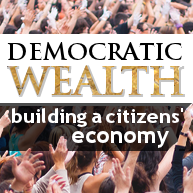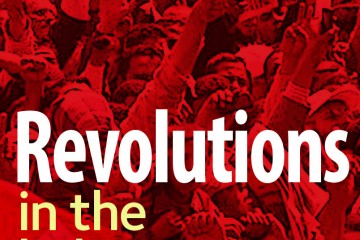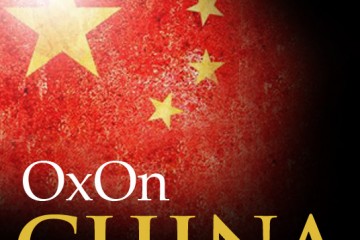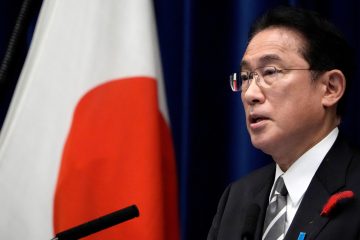
Democratic Wealth: free e-book on building a citizens’ economy
‘Democratic Wealth’ is a collection of essays that challenges the poverty of thinking around economic policy, particularly after the 2007 financial crash. It explores the renewed interest in republicanism and suggests this as a framework to shape an economy that serves the common good. It is a selection of articles from a series published by openDemocracy and Politics in Spires, a blog run by the universities of Oxford and Cambridge.
The book is split into three parts. The first, Taking Back the Economy, features contributions from Philip Pettit, Thad Williamson, Joe Guinan, Jessica Kimpell and others on republican thinking and the market. The second, Republican Economy in Practice, looks at application around the globe, including contributions on cooperatives, sovereign wealth funds, basic income, tax fairness and green solutions and discusses how to develop these models at scale. In the third, Republican Politics, contributors including Quentin Skinner, Alex Gourevitch and Karma Nabulsi discuss the politics of republicanism, from challenging the surveillance state to democratising the workplace and harnessing the demands of new social movements for freedom from domination by the one per cent. It ends with an afterword by James Meadway, senior economist at nef, on clearing a path for a better future.

The insecurity of a security state: What can Hannah Arendt tell us about Egypt?
In Egypt, it is clear that constructive results are not going to materialise anytime soon. Increasing state violence, arrests and intimidation have no clear logic beyond an attempt by the security apparatus to regain power and tighten control over the economy. It is an outworn order that risks collapsing.
While the regime does have a serious security issue on its hands, namely the Sinai-based terrorism that has now spread to Cairo, the regime is increasingly blurring the lines between terrorism and anyone who opposes the official line. Labelling the Muslim Brotherhood as a terrorist organisation, outlawing anti-regime protests, cracking down on NGOs and the clampdown against anti-regime activists and journalists are indications that the security state is disintegrating. The regime is carrying out violent measures against Islamists and youth – two major groups that cannot afford to be alienated – signalling the regime’s struggles to control a significant segment of the population via peaceful means.

If we are to apply it to contemporary politics, which republicanism should we be talking about?
Too narrow an interpretation of republicanism can rob us off many of the tools and insights we should now be employing. This is no time for elite paternalism.
As an intellectual tradition, republicanism is a broad church. J. G. A. Pocock’s seminal charting of a particular part of that tradition, his genealogy of republicanism’s role in Britain’s 13 North American colonies’ struggle for and consolidation of their independence in The Machiavellian Moment, takes in figures as different as Niccolò Machiavelli and Alexander Hamilton.
Any attempt to draw on the republican tradition for contemporary political insight needs to be aware, then, of the variety of thinkers who fall within it and the specificity of the problems they were trying to solve. Often their differences are considerably greater than their similarities, and in failing to appreciate those differences, much of the sophistication and plausibility of the lessons we might learn from the tradition can be lost.

Republicanism and revolutions: a tradition of theory and practice
Republicanism can be explored as a tradition of practices and virtues, tied to the creation of revolutions. At this tradition’s core, and what attaches it through time and place, lies a recurring dominant principle – that of popular sovereignty.
Hannah Arendt, for one, doesn’t think there can be such a tradition of revolutions, because it is a treasure, a public good, which she claims is irrevocably lost between generations. In her The Gap between the Past and the Future, she begins her own quest for the lost treasure of revolutions with the mysteries of its definition:
“The history of revolutions… could be told in parable form as the tale of an age-old treasure which, under the most varied circumstances, appears abruptly, unexpectedly, and disappears again, under different mysterious conditions, as though it were a fata morgana. There exist, indeed, many good reasons to believe that the treasure was never a reality but a mirage, that we deal here not with anything substantial but with an apparition, and the best of these reasons is that the treasure thus far has remained nameless. Does something exist, not in outer space but in the world and the affairs of men on earth, which has not even a name? Unicorns and fairy queens seem to possess more reality than the lost treasure of the revolutions.”

What an El Sissi presidency would mean for Egypt’s relations with the Gulf States
The announcement by Egypt’s Defense Minister, now Field Marshall, Abdel-Fattah El Sissi that he would be running for president was greeted with joy and with apprehension, not only in Egypt, but also in the Gulf States. If current trends hold, it seems increasingly likely that El Sissi will be comfortably elected to serve as president of Egypt for at least the next four years. Egypt’s relations with the Gulf States under a potential El Sissi presidency will largely be shaped by the positions these states have taken in the past few months.
Saudi Arabia, Kuwait, the UAE and Bahrain, who considered the Muslim Brotherhood to be a significant domestic threat, have strengthened relations with Egypt following the overthrow of former president Mohammed Morsi. Saudi Arabia, Kuwait and the UAE, who welcomed Morsi’s overthrow immediately pledged $12 Billion to post-Brotherhood Egypt, increasing their assistance in the subsequent months. If elected, President El Sissi will look to build on the current relationship with these states, possibly by visiting Riyadh, where he previously served as military attaché, and Abu Dhabi soon after the election. Although the UAE’s Prime Minister stated in an interview with the BBC that he “hopes (El Sissi) remains in the military, and that another person [runs] for the presidency”, a clarification was soon issued by the official news agency saying that the “brotherly advice is that General al-Sissi should not run as a military man for the post of the presidency”. El Sissi has already stated that Saudi’s support for Egypt will “never be forgotten” and expressed gratitude for the UAE’s aid.

What is the future for the ‘China governance model’?
The leadership turnover in China last year took place in a shifting political situation. Namely, there have been increased calls for more political accountability and multi-candidate elections, broader media freedom and financial reform.
We need to watch this closely. How China’s leadership reacts to these calls for change will determine whether it will continue its phenomenal ‘rise’ or be hampered by intransigence.
Let’s take a closer look at the context. The uprisings in the Arab world have prompted many to ask whether China will be the next to be swept along in a wave of popular unrest that has toppled rulers in several countries. Indeed, the Chinese leadership, both in power and previously in power, has been watching the situation carefully. This attention has been particularly justified considering that the current Chinese president assumed power at a time when social media became a real force. These new forms of communication played an undisputable role in the Arab and Maghreb uprisings. Now, half a billion Chinese are registered on Sina Weibo, a website much like Twitter. This online platform has served “netizens” to voice many complaints ranging from governance malfunctions and corruption to food and environmental issues.
This raises inevitable questions. Is the bid for democratic reform a matter of time? Might the prediction of an “end of history” and of a uniform move in the direction of liberal democracy make a comeback? Or, might there be other sustainable alternatives?

National Dialogues and Dilemmas: Reflections on Libya and Yemen
The Arab uprisings, initially perceived as one unit of analysis, have gone through a rite of passage and identified themselves as distinct from one another; it is no longer logically sound to talk of one “spring”. Nevertheless, it is instructive to extract lessons learned from each experience and place them into conversation with one another. An Arab dialectic seems possible instead of a unified discourse on change and transitions. Libya’s ‘national dialogue’ has been launched in the hope of carving out a space of peace across the country and for developing a form of consensus on what is perceived as a reborn Libyan nation, post-Qaddafi. The National Dialogue Preparatory Commission’a (NDPC) Chairman Fadeel Lame emphasised that Libya needs to “move from one stage to another and from one situation to another and that this transition could be achieved only through the power of dialogue.”[1] Earlier in September 2013, Tarek Mitri, who heads the UN Support Mission in Libya, described it as a process that “would give voice to many Libyans and opens a space that does not exclude any of those who may have contributions to make to public life and are otherwise isolated, separated or entrenched in their partisan attitudes… [to] promote a national capacity to address urgent priorities and ensure public support to the efforts of state-building.”
The need for dialogue is indisputable in a country that seems ridden with conflict. In Tripoli, separatist movements gaining ground in the eastern part of the country. General instability highlights the urgency for dialogue – and the difficulties. Recently, militias from Misrata opened fire on peaceful protestors in Tripoli who were calling for the departure of militias and the restoration of peace. According to one account, more than 40 were killed and 400 wounded in the clashes.[2] The General National Congress (GNC) and government agencies froze; it was only through the intervention of local councils and civil society that an end of violence was reached.[3] As described by the reporter: “There was a tense calm in Tripoli on Sunday after more than 48 hours of bloodshed. Civil-society and community leaders abided by a general strike that coincided with a national mourning period for those slain. Shops were shut and normally busy commercial streets were devoid of traffic on the first day of the working week, witnesses reported.”
The question here then is not about need – in an ideal world, developing consensus among the Libyan people towards state building and a national identity would be the way out.
It is about capacity.

Can democrats learn from Machiavelli?
When politicians are described today as ‘Machiavellian’ the implication is that they are no more than cynical graspers at power for its own sake. Most historians of political thought have long argued that Machiavelli’s own views and politics were more complex than this. In his 2011 book, Machiavellian Democracy (previously reviewed for OurKingdom by Guy Aitchison), the political theorist John P. McCormick offers an innovative reading of Machiavelli. According to McCormick, Machiavelli was not only a republican thinker, but by the standards of his day, and our own, a radically democratic one. Moreover, some of Machiavelli’s ideas, such as his advocacy of plebeian, tribunate institutions, arguably remain relevant to today’s discussions of democratic renewal. Robert Jubb and Stuart White interview John here for the ‘Democratic Wealth’ series.









